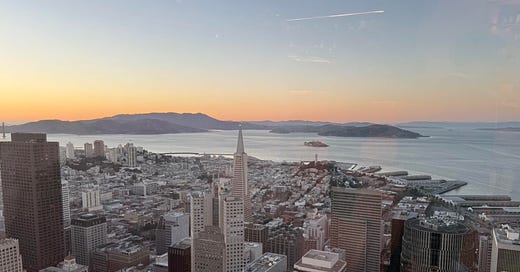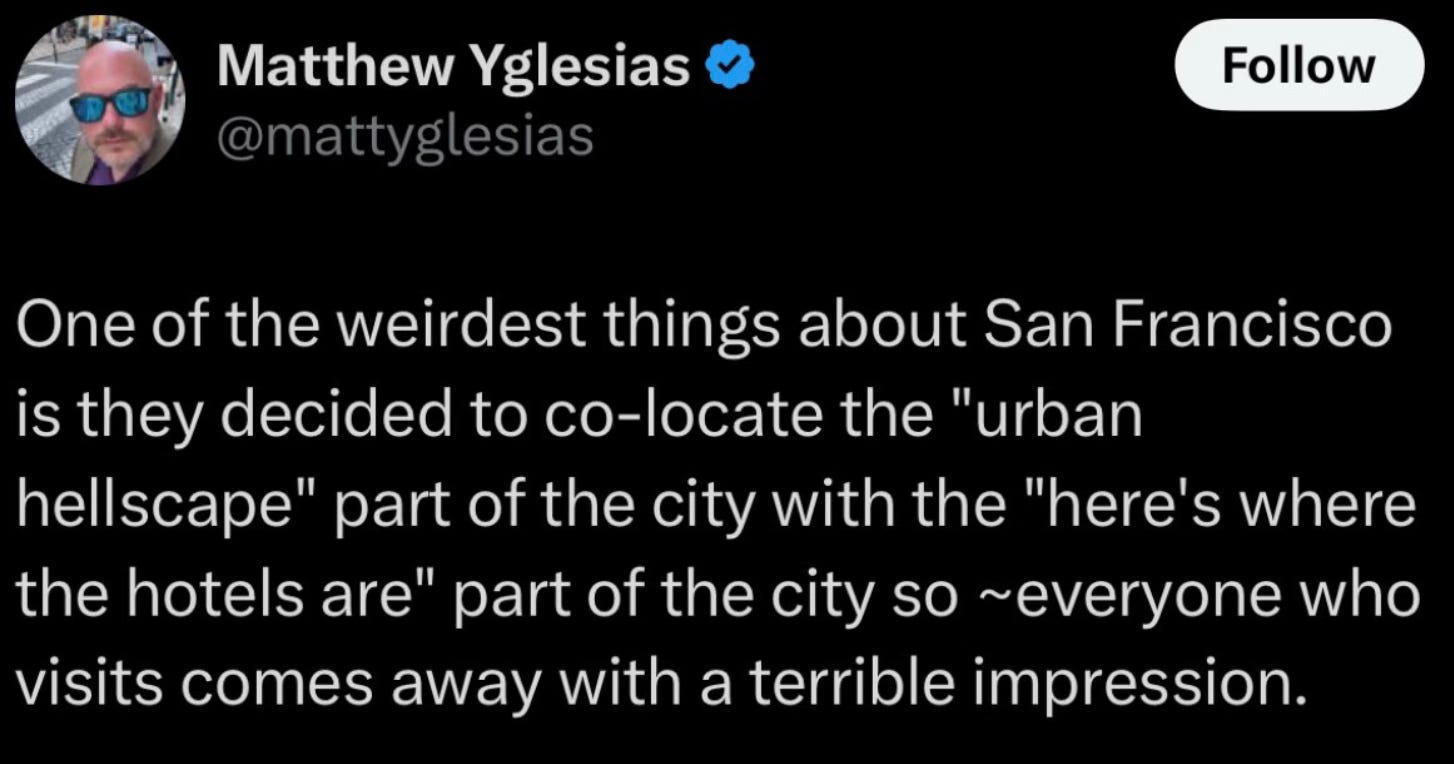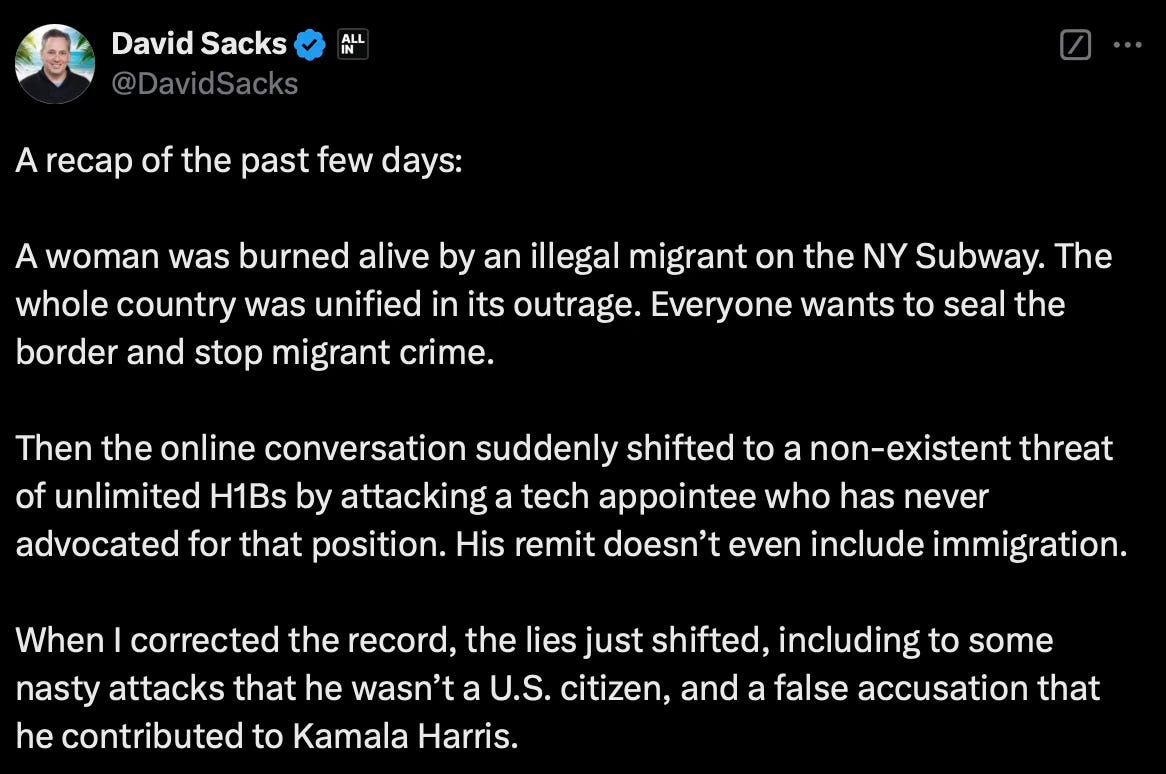The city of civilizational greatness
Reflections on visiting San Francisco and the current political landscape
How many men in a thousand million, he asked himself, reach Z after all? Surely the leader of a forlorn hope may ask himself that, and answer, without treachery to the expedition behind him, “One perhaps”. One in a generation. Is he to be blamed then he is not the one? provided he has toiled honestly, given to the best of his power, till he has no more left to give? And his fame lasts how long? It is permissible even for a dying hero to think before he dies how men will speak of him hereafter. His fame lasts perhaps two thousand years. And what are two thousand years? The very stone one kicks with one’s boot will outlast Shakespeare. His own little light would shine, not very brightly, for a year or two, and would then be merged into a bigger light, and that into a bigger still.
(To the Lighthouse, Virginia Woolf)
Those are the musings of Mr Ramsay, the male protagonist of Virginia Woolf’s To the Lighthouse. Mr Ramsay, a respected academic, is consumed, and one could even say tortured by, a concern for his legacy. Towards the end of his career, he is confronting a fundamental question: beyond the petty squabbles of academia, the immediacy of a recognition or another, how much will his work matter in the grand scheme of things, when one thinks not in years, but millennia?
If Mr Ramsay was a city, Mr Ramsay would be San Francisco1, which I visited for the first time two months ago.
One could simply say San Franciscans are ambitious. And that would be true, but incomplete. “Ambition” has a somewhat bourgeois connotation to it — someone who gets an MBA, goes on to work for a prestigious company and climbs the corporate ladder is ambitious. This is for example the vibe I sensed in Oxford, where the dream was to get a good job in The City, the financial district of London, become reasonably rich and get a nice house in the countryside, spending one’s 50+ years happily surrounded by family.
Yet there is nothing bourgeois about the ambition that animates San Francisco: the ultimate, unspoken goal here is not merely success, but greatness, in all the depth and power that the word implies. This is accompanied by a certain disdain for the tepid ambition of those who merely follow the “established path”. The ultimate goal is having a say in how the future itself will play out, or “bending reality to one’s will”. Being a real world ubermensch. Great individuals have existed everywhere, but I am not sure there has ever been a place in history that has concentrated so many people who want to be Napoleons.
Of course, this is somewhat delusional. Statistically speaking, one cannot sanely expect greatness in one’s life. But, as Tobias Huber and Byrne Hobart point out in Boom: The End of Stagnation, (constructive) delusion is a prerequisite for greatness. The narratives pervading San Francisco create a self-fulfilling prophecy and do ultimately generate extraordinary things. Not for the individual aspirant, of course: in this story, each ambitious young person arriving in SF is merely a coin toss. But inspire enough coins to toss themselves high enough, and collectively, greatness shall be reached. Failures do not matter, it’s the 100x successes that drive everything forward.
And Silicon Valley has driven America forward. The tech industry is a crucial driver of US economic growth, and the dire consequences of a lack of similar innovation can be seen in Europe. It has given birth to companies like Tesla and SpaceX, with the latter pursuing the most expansive goal of all: making civilization multiplanetary (and in the meantime providing high quality internet connection across the world). And, perhaps most importantly now, we are witnessing the beginning of an Artificial Intelligence revolution, originated as well in Silicon Valley.
On aesthetics
In To the Lighthouse, it is Mrs Ramsay, the wife of the aforementioned Mr Ramsay, whose life is consumed entirely by the little minutiae of everyday life: making sure that her family, and chiefly her husband, are happy, keeping track of everyone’s desires. And losing herself in the process. At the end of one of her days, she has done nothing and everything. For her, life is not made of great achievements, but a constant hum-drum of little moments, each one of them of supreme importance:
What is the meaning of life? That was all- a simple question; one that tended to close in on one with years, the great revelation had never come. The great revelation perhaps never did come. Instead, there were little daily miracles, illuminations, matches struck unexpectedly in the dark; here was one.
It is perhaps characters like Mrs Ramsay that would be hardest to find in a place like San Francisco (and women in general, perhaps not coincidentally). There is of course a fundamental tension between living for the future and fully experiencing the day-to-day, in all its mundane richness. As such, one could say that San Francisco is not a city made for living, but a city for dreaming big and doing.
San Franciscans are friendly and gregarious. But in social interactions one can also sense a subtle, barely perceptible nervousness, a sort of fidgety preoccupation. After all, talking for the sake of talking, with no concrete goal, is not really putting anyone on the path to greatness. Just enjoying oneself, fully relaxed, satisfied with experiencing life is not enough. Life itself seems to be forgotten, in the expectation of a greatness that might never be achieved. Perhaps that’s the explanation for Matthew’s observation in the below tweet?
The other element that has to suffer is aesthetics, quite broadly speaking. Everything is stripped to its important essentials and anything that is purely ornamental is seen as superfluous, unnecessary, even encumbering. While Silicon Valley has an appreciation for (nerdy) culture, there is comparatively little for art, even for the most cerebral of them, literature. I have met many who voiced a similar sentiment to what SBF famously said:
I’m very skeptical of books. I don’t want to say no book is ever worth reading, but I actually do believe something close to that. I think, if you wrote a book, you fucked up, and it should have been a six-paragraph blog post.
Robin Hanson, an important rationalist thinker, has a similar opinion about literature, contesting the idea that it gives one any insights:
What evidence suggests that readers of such stories have gained such insight, instead of merely gaining an intuition telling them of such insights?
Of course, such attitudes reflect themselves into the type of culture that the Bay Area has produced. For The Bay is not merely a generator of technology, but also (and perhaps more importantly, on some level?), of culture. Say what you will about rationalism, the once niche internet ideology clustered around blogs like LessWrong and SlateStarCodex and its associated movement, Effective Altruism — they remain some of the most innovative and impactful new ideologies of the beginning of the century.
The scope of Bay Area culture is of course in line with its reverence for greatness and disdain for aesthetics and the day-to-day: by obsessing over the creation of the “Machine God” long before the mainstream took AI seriously, rationalists catalysed real world action in this direction. Effective Altruism sought to transcend day-to-day “small scale” altruism and mostly concerned itself with big topics: existential risk, maximising the number of lives saved in Africa and so on. And, in characteristic totalizing fashion, it saw itself not merely as a new approach to policy or charitable giving, but no less than:
Effective altruism is not a package of particular views. It's about using evidence and careful reasoning to try to do more good. What science is to the pursuit of the truth, EA is, or at least aspires to be, to the pursuit of the good.
(William MacAskill - one of the founders of EA)
But, from the outside, despite its grandiosity, such an ideology is often seen as “cold” and not really touching upon that which most people need from a moral system2. One could even say that its obsession with quantification, with dismissing the intuitive, is what led to the movement’s relative downfall through the SBF scandal (who also, coincidentally, considered Shakespeare unimpressive).
An awe for greatness
2020-2021 was perhaps the peak of the “wars” between an increasingly frustrated with the mainstream tech intelligentsia and what
would call “The Village”, or members of the more mainstream, “conformist” intellectual elite (academia, mainstream media, most think tanks and so on). This was back when former Washington Post journalist Taylor Lorenz was falsely accusing prominent people in tech of various transgressions, including making up a story about Marc Andreessen using slur words on Clubhouse. 2021 was also the year when Scott Alexander, arguably Silicon Valley’s most influential writer, was doxxed by the New York Times. And, of course, it was the era of Covid, a topic “The Village” decided to be very hawkish on and any deviation from orthodoxy elicited all sorts of unfair accusations — notably those who suggested the possibility of a lab leak being accused of racism and “spreading misinformation”3. At the time, The Village looked dominant.Since then, the vibes have massively shifted. In many ways, it seems the Taylor Lorenzes of the world have lost, at least relatively speaking. Taylor Lorenz herself has left Washington Post (after another incident that involved her lying) and seems to split her time between celebrating the murder of CEOs and complaining about people not wearing masks outside. The Covid period is over and when people remember it, they mostly think of public health having fumbled it. Elon Musk bought twitter, turned it into X, fired most of its employees and removed censorship (at least in the US). Most importantly, Trump winning has led to the beginning of a recognition that “The Village” had been imposing a level of ideological conformity that led to a backlash from the general public.
And, perhaps more concretely, some of the biggest voices in Silicon Valley have gained important positions in the Trump cabinet — David Sacks as AI & crypto czar, for example. And this makes many jubilant. It is clear in many ways that Silicon Valley wants to cement this cultural and political victory beyond a Trump presidency. To turn the Village less village-y and change culture and policy. The main preoccupation is a fear of stagnation and what needs to be done in order to avert it — a preoccupation that I fully share. Someone in Silicon Valley asked me: “How do we inspire in people an awe for greatness?” In other words, how do we bring a bit more of the Bay Area spirit into Washington and culture at large?
This is a good question, because most people do not live for greatness, like the San Franciscans. Most people live for the day-to-day. What’s more, technological innovation, as important and underpinning for everything as it is, will not in and of itself excite people and provide them with meaning in the way it fires up those who create it. Not unless it’s attached to some other sense of “meaning”, that feels more tangible for the day-to-day livers.
Perhaps this is the lesson that David Sacks should draw from the latest twitter debacle around high-skill immigration. The unpleasant reality is that, for many who have supported Trump, this day-to-day sense of meaning is not given by a desire to make America greater via better companies, but a sense of communion, brought about through excluding others.
I hope that an ideological movement generating in the Valley will manage to supplant this with another, better sense of meaning. If such a movement wants to succeed and last, it has to consider aesthetics, as much as this dimension is relegated to second place in the Valley. In this regard, I think the broad “Progress Studies” movement does a much better job than say, Effective Altruism.
It might also need to answer the pervasive question: “What for?”. The purely cerebral might need to think how to touch hearts, by conveying some of the thymos of those who develop technology to those who don’t. This means that, unlike Effective Altruism, it has to paint a picture of progress enabled human flourishing that goes beyond dry statistics. In order to motivate the mundane to admire the Great, the Great might need to first pay some homage to the mundane. After all, Mr Ramsay depended on his wife emotionally, looking for comfort when he felt defeated by his pursuit of greatness, a dependency that seemed quite paradoxical to Mrs Ramsay herself:
But it was their relation and his coming to her like that, openly, so that anyone could see, that discomposed her; for then people said he depended on her, when they must know that of the two he was infinitely the more important, and what she gave to the world, in comparison with what he gave, negligible.
When I talk about such a movement’s success, I do not even necessarily mean with the average voter, but also, and perhaps more importantly, other elites. The truth is that even most of those who are, relatively speaking, “winners” in today’s society, find eternity a bit too cold, knowing very well that the chance to uniquely shape the future is reserved to extremely few and that their own flame shall not burn for too long after their deaths.
In assessing the vibe of San Francisco, I am referring of course to a very specific part of San Francisco, which is the tech side.
At the end of the day all debates about Effective Altruism are uninteresting because it is always one side that has this intuition about the fundamental lack of thymos of Effective Altruism and another side that does not have it. So the debate never reaches any relevant conclusion. To resolve any speculations about *my* opinion of Effective Altruism: I think it’s a movement that did concrete good by popularising a more evidence based approach to charitable giving and policy, but also, I do not see it as a satisfactory or full “moral system”.
I do not have a firm opinion on the topic and in fact favour natural origins, this is mostly a comment on the unfair treatment of those who voiced their opinions.







Interesting to hear your thoughts. I work in AI safety and my partner is senior at a significant EA aligned org. Yet I find the ambition you describe mostly nauseating and insufferable. You write about the day to day livers a tad condescendingly. But IMO there's a reason that basically all wisdom traditions teach a version of radical selflessness/non-ego/moment-living as the path to enlightenment.
Systemically it might be true that mentally/spiritually healthy, much less notably developed, people don't drive innovation, so there's something to be said for the value of those kind of people to humanity. And as a secular person who's trained and worked in CS, statistics, and ML for decades, I couldn't be more in favor of good measurement, expert analysis, and clear statements of priors and assumptions and values when deciding public investment, be it charitable or government. But God help us if we let those people choose our ideology and moral framework!
It’s not just the tech side. Kamala Harris, Gavin Newsom and Nancy Pelosi all came from the hothouse of ambition here. You can also see it in all the Nobel prizes Berkeley and Stanford have. There is a lot more to San Francisco than just tech.